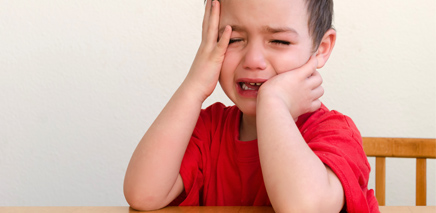How to Handle Toddler Tantrums

Most of the time toddlers are terrific. They’re cute, energetic, and fun to be around. But what happens when your toddler expresses anger? How do you handle toddler tantrums? Do you try to stomp out the fire as soon as it sparks? What message does that send to your child about their right to express negative emotions?
Let’s say, for example, that your toddler yells at you to “leave me alone!” as you try to put their shoes on to go outside, or pulls the cat’s tail when it walks across the puzzle they are attempting to put together. Do you tell them to put their angry words away or send them into time out because they’ve hurt another living creature? Or do you remain calm, acknowledge feelings, and read between the lines to try to understand the source of the anger?
Here are some things to keep in mind when handling toddler tantrums:
- Is there a reason for the emotional outburst? Very often, if your toddler is tired, hungry, or thirsty, their emotional tone and response will seem disproportionate to the reality of the situation. (Let’s admit, this can be true for adults, too.) If you believe fatigue, hunger or thirst to be the cause of your toddler’s emotional response, simply take steps towards remedying the situation by ignoring the behaviour and planning for an earlier bedtime or providing them with a healthy snack as soon as possible.
- Acknowledge their feelings. Anger is as important and healthy an emotion as any other. Holding anger in can be more damaging than letting it out. It’s important to let your toddler know that anger is an acceptable emotion but their behaviour may not be. You can do this by saying something like: “I see that you’re angry at the cat for stepping on your puzzle.”
- Then, offer suggestions for a change in behaviour next time. For example: “Next time you’re angry at the cat for stepping on your puzzle, please ask me to put the cat out of the room. Pulling his tail hurts him”
- Ask “is this normal?” Understanding your toddler’s stage of development may help you to normalize the behaviour, or not. Often, a toddler’s desire for increased independence will lead to feelings of anger. Not being able to empathize with others may also lead to anger. Sometimes not having enough words to describe feelings may lead to angry actions instead.
- Let your child know how their behaviour affects others and establish limits. “When you hit me I feel upset because hitting hurts. It’s okay to feel angry, but next time you hit, I will take you to another part of the room so that you can have some time away from others.”
- Do they need your help? If a child is showing frustration in the form of anger, acknowledge their feelings of frustration, then offer assistance. If your child appears out of control, you may want to consider containing their physical and emotional flailing in a loving, comforting way by wrapping your arms around them, putting them on your lap and calming them through soothing words and touch.
Also, remember to model your anger in a way that is consistent with what you’d like to see in your toddler. For example, it’s okay to show anger and allow anger to be shown by others so long as no one is getting hurt and the anger is being expressed in a respectful manner.
Some books that I often recommend to clients dealing with challenging or worrisome behaviour include:
The Emotional Life of the Toddler by Alicia F. Lieberman and Your Two-Year-Old: Terrible or Tender by Louise Bates Ames. The latter is one in a series of books that looks at each year of a child’s life from a developmental perspective.
















